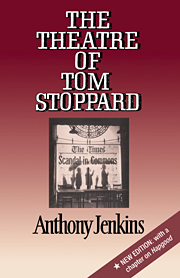4 - Trapped in language
Published online by Cambridge University Press: 08 January 2010
Summary
At one point in the first Act of Jumpers, George Moore complains to Inspector Bones about the difficulty he has experienced organizing the paper he intends to deliver at a philosophers' symposium: “the words betray the thoughts they are supposed to express. Even the most generalized truth begins to look like special pleading as soon as you trap it in language” (46). The idea derives from Wittgenstein's Philosophical Investigations, but such ‘influence’ is a complicated matter. Stoppard constantly reminds interviewers and critics alike that what a person writes about is largely a matter of temperament. His novelist friend, Derek Marlowe, commenting on Stoppard's work habits, gets them wrong:
For Tom, writing a play is like sitting for an examination. He spends ages on research, does all the necessary cramming, reads all the relevant books, and then gestates the results. Once he's passed the exam–with the public and the critics – he forgets all about it and moves on to the next subject.
Far from forgetting his homework, Stoppard used it to advantage in Dogg's Our Pet, while waiting for the first rehearsals of Jumpers, and would return to that material some years later, transforming Pet's game-playing into political statement.
In addition, what a writer swots up for his public exam is bound to have a personal significance. One cannot be sure exactly when Stoppard began reading the Austrian philosopher, but as early as Free Man Linda talks casually about there being “two of everyone. You see you need that, and if the two of him's the same, I mean if [her father is] the same in the pub as he is with us, then he's had it.”
- Type
- Chapter
- Information
- The Theatre of Tom Stoppard , pp. 72 - 98Publisher: Cambridge University PressPrint publication year: 1989



